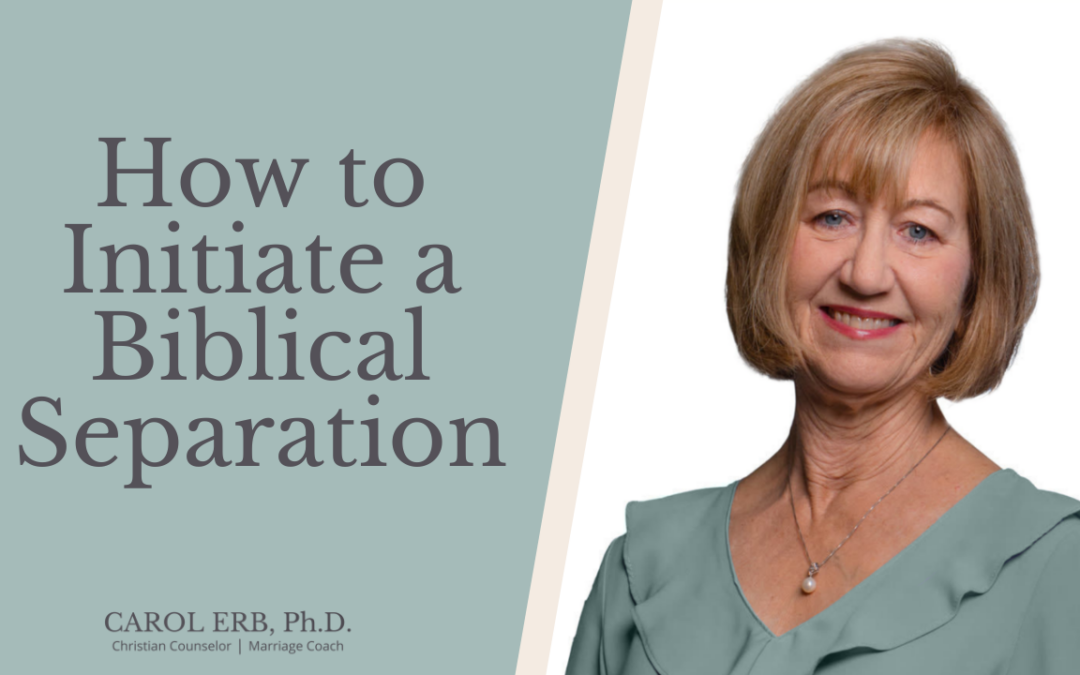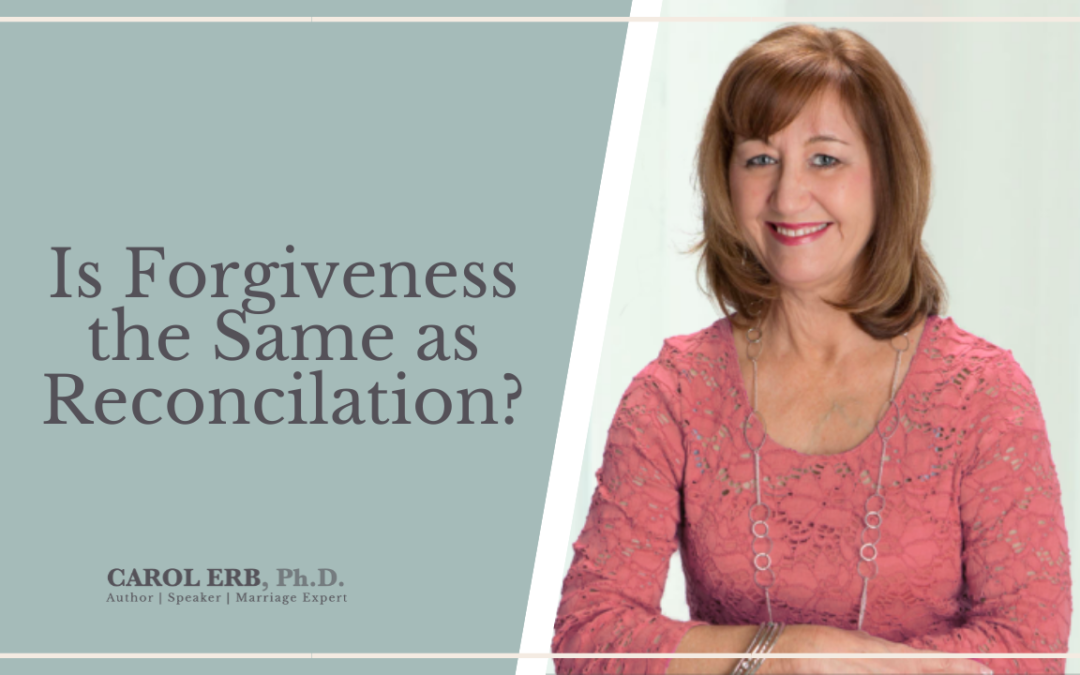
by Carol Erb | Christian Marriage Coaching |
How to Initiate a Biblical Separation
Finding out that your spouse has had an affair probably came as a huge emotional blow to you. In fact, you may have even come to the conclusion that your marriage cannot be repaired. A lot of individual feel that way after learning of their spouses’ betrayals, and they start considering a separation.
If this is what has been on your mind, I want to help. Biblical separations are possible, and it is important for you to know how to proceed. There are only two steps you should consider taking.
Step #1: Spend Time Seeking God
There are so many Scriptures that tell us how important it is to seek God in everything we do. James 1:5 says, “If any of you lacks wisdom, you should ask God, who gives generously to all without finding fault, and it will be given to you.” That is a wonderful promise from your Heavenly Father. It is reassuring to know that all you need to do to get Godly counsel is ask God.
As you pray, ask God:
- To begin the healing process in your heart.
- To guide you to the right people who can help you through this trying time.
- To help you know how to proceed with the separation.
Staying connected to your faith in God is a critical part of the healing process after an affair. Remember, he is always there for you to comfort and guide you.
Step #2: Choose the Right People to Confide in
As a betrayed spouse, it is difficult not to share about everything we are going through with our friends and family. This is especially true for the painful events in our lives. While it can be helpful to talk about what we are feeling and experiencing, confiding in the wrong people can do more harm than good.
Sometimes people are quick to blame the betrayed spouse for the betraying spouse’s infidelity. They may not do it directly, but they may make statements like:
- Your spouse might love you more if you didn’t work such late hours.
- Are you sure you are having sex often enough for your spouse?
- Have you made your home a welcoming place for your spouse?
They may think that they are trying to help, but really, what they are saying can lead you believing that the affair was your fault.
A better option is to discuss the affair with a trusted pastor, counselor or another spiritual leader. They can help you by guiding you through the process of a Biblical separation the right way, with the outcome you are looking for without making you feel as though you are to blame for your spouse’s betrayal.
Christian Marriage Coaching and Counseling Offers a Solution
Every situation is different, and it is important to work with a professional who can meet you where you are and help you work through this difficult time. As a Christian Marriage Coach and Counselor, I have had the pleasure of working with many individuals plan a biblical separation as they make these hard decisions.
If you would like to make an appointment with me, you can do so by emailing me at hello@drcarolerb.com or by filling out the form on my contact page.
A Biblical separation is a major step, and it is not one that you should take without wise counsel. I would love the opportunity to work with you and help you through this challenging time through prayer and seeking God’s will for you together.

by Carol Erb | Christian Counseling, Christian Marriage Coaching, Pornography & Sexual Addiction |
Discovering that your spouse has had an affair you causes a range of emotions. You’re hurt, you’re confused, and eventually, you become angry. In this situation, you’re right to be angry because of what he has done. However, it’s important to understand that the anger you’re experiencing is only a temporary emotion, and there are right ways and wrong ways to express it, according to God’s Word.
YOUR ANGER AT YOUR SPOUSE’S AFFAIR AND YOUR INITIAL RESPONSES
Once the anger stage sets in, we rarely think rationally about our responses. At that point, we’re basically operating solely on our emotions, and that can be a dangerous place to be. Have you reacted in any of these ways?
- Verbally bashing your spouse – Responding verbally can mean calling your spouse names, looking for excuses to get into shouting matches with him, or putting him down any chance you get. These responses only lead to resentment and they don’t do anything to heal your marriage, or your heart.
- Non-verbally bashing your spouse – It is possible to bash your spouse in non-verbal ways, and we do this with gestures, with angry looks, or even just purposefully ignoring them.
- Suppressing your anger – You feel angry on the inside, but you’re working really hard to hold it in. Maybe you don’t want to give in to it because you’re afraid it will make you appear weak, or it’s possible that you just don’t want to start an argument. This type of response might seem like the right one at first, but it can lead to a host of mental and physical problems for you later on.
- Passive-aggressive behavior – Some become masters at passive aggressive anger, and maybe you have too. You may “forget” to complete a task your spouse has asked you to do, or you might begin being chronically late, or respond to them with sarcasm.
- Complaining about your spouse – We often refer to this as “venting” and everyone feels as though they have the right to vent at some point. However, what you’re really doing is complaining, and you’re only feeding into the anger you already feel, instead of helping to heal it.
- Physical aggression – Some act out in physically aggressive ways, and while they might not hit their spouse they will hit walls, throw objects across the room, or break things. It might feel good in the moment to react in this way, but it’s certainly not healthy.
ANGER ACCORDING TO GOD’S WORD
It may feel right for you to respond with emotional anger, but that kind of response never really helps you find a solution. God knew that we were all going to struggle with anger at some point in our lives, but in His wisdom, He provided us with self-control. If you’re not careful, anger can drag you into sin, and that’s something you want to avoid. Ephesians 4:26-27 says, “When you’re angry, do not sin; do not ever let your wrath (your exasperation, your fury or indignation) last until the sun goes down. Leave no room or foothold for the devil.”
Is your anger over your spouse’s affair righteous? Yes, it is. However, as Christians, we want to be sure we’re responding in ways that are righteous too.
Working with a Christian Marriage Coach can help you understand the root of your anger so that you can deal with it in ways that will help you, and not harm you. If you would like to talk with me about your personal situation, please contact me at 843-379-0288. You can also make an appointment through my online scheduler. Together, I’m confident that we can work through the source of your anger and help you find the healing you need.

by Carol Erb | Christian Counseling, Christian Marriage, Christian Marriage Coaching, Marriage Coaching |
It’s fairly common to hear couples say that they refuse to forgive their spouses because for them, forgiveness means that the wrong behavior is OK. I think it’s important for us to remember that the world has a false idea of what forgiveness is, and in order to properly define it, we need to go back to God’s Word. Is forgiveness the same as reconciliation?
In Romans 13:8, it says, “Let no debt remain outstanding, except the continuing debt to love one another.”
The world believes that forgiveness isn’t a necessary part of life, nor should it be a necessary part of marriage. Worldly experts are constantly advising people to hang onto their anger as a way to protect themselves from getting hurt again. However, some actually advise the opposite. They tell people who have been hurt that they can’t trust their emotions, and they need to push those negative thoughts out of their minds and continually forgive, regardless of how they feel. Many experts even believe that as long as you pray, all of your resentments will be healed and gone.
As you can see, the so-called “expert” opinions on forgiveness vary so much that it’s hard to know what you should believe. While some of these opinions might sound OK on the surface, they are wrong. The truth is that unforgiveness and resentment has a tendency to fester. It can and will eat at you, and eventually it will kill your love for the person you’re refusing to forgive. However, forgiveness cannot be done overnight. It’s a process that does take time.
In addition, it’s important to understand the differences between forgiveness and reconciliation.
GRAB YOUR FREE COPY OF MY EBOOK BY CLICKING HERE AND LEARN THE 8 SUREFIRE STRATEGIES FOR RECOVERING FROM A HUSBAND’S AFFAIR
IS FORGIVENESS THE SAME AS RECONCILIATION?
Perhaps you’ve been holding onto some type of hurt because you don’t want to be reconciled with your spouse; at least not yet. As a result, you’re refusing to forgive. You don’t have to reconcile with your spouse the moment you forgive him or her, and the two things are really very different.
Forgiveness is about you extending mercy and grace to the person who hurt you. Remember, mercy is when you get something you don’t deserve to get, while grace is when you don’t get what you do deserve. When you forgive, you’re setting your offender free, and you’re placing that person on God’s “hook” instead on yours. You’re not denying the fact that you were hurt because that would not be possible. Instead, you’re giving yourself permission to feel the hurt and then you’re releasing it so that it doesn’t have power over you any longer. Furthermore, forgiveness only takes one person – you. Reconciliation takes two people.
THE 3 STAGES OF FORGIVENESS
Forgiveness generally happens in stages, and it’s not something that can occur all at once. It’s essential to go through the stages of forgiveness before you can actually forgive. Those stages are:
#1. Facing the Offense: You have to face the reality of the negative effect the offense has had on your life. You also need to realize that being treated that way is not something that’s OK with you.
#2. Feeling the Offense: If you refuse to feel the pain you’re in, you’re actually denying that pain. Denial is not something you want to live in.
#3. Forgiving the Offender: Choosing to forgive is often the hardest thing to do, but it can also be the most rewarding, even if you never get an apology. Remember, forgiveness is not about forgetting what happened, but it is about releasing the debt of the person who caused the pain.
Are you struggling with unforgiveness? I’ve worked with many women over the years who were trapped by unforgiveness. If you’re waging this battle, I’d like to help you find the healing you need to forgive and move on.
If you’d like to talk with a Christian marriage coach about working toward forgiveness, I’d love to help you. Please contact me at 843-379-0288. You can also contact me through my online scheduler for a free complimentary call. I’m available face to face, over the phone or via video call. When you hold onto unforgiveness, the only person who truly suffers is you. With the right kind of professional help, you can embrace forgiveness and freedom from those heavy chains.




Recent Comments